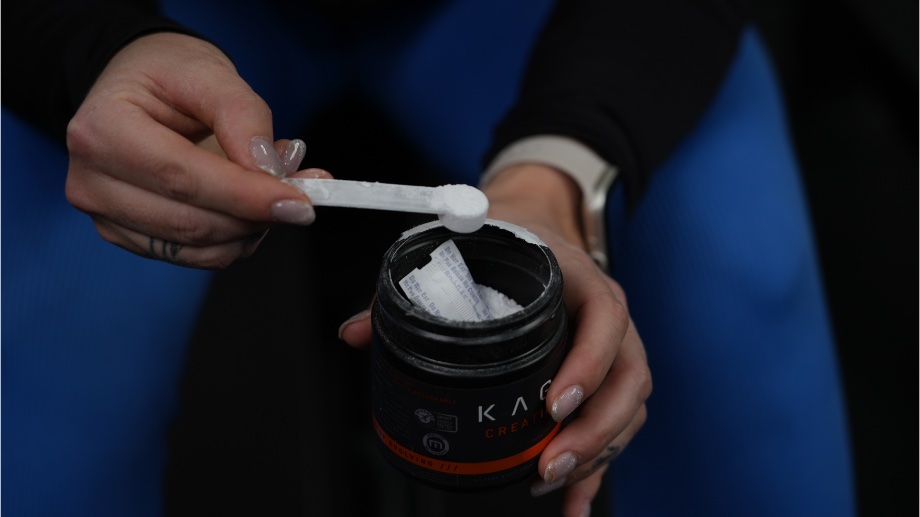We test and review fitness products based on an independent, multi-point methodology. If you use our links to purchase something, we may earn a commission. Read our disclosures.
Next to protein powders, creatine is one of the most popular sports nutrition supplements. But it’s also no stranger to controversy. Those who love it swear by it, and those who don’t use it have a lot of questions—like, “does creatine make you gain weight” or “does creatine cause hair loss?”
As fans of creatine ourselves, we’re here to put some rumors to rest. Since a lot of misconceptions around creatine stem from misinterpreted science, we’re relying on that science to get to the bottom of your concerns. Here, we’ll discuss creatine’s effects on your weight and answer some other commonly asked questions about the dietary supplement.
Medical disclaimer: This article is intended for educational and informational purposes only. It is not intended as a substitute for medical advice. For health advice, contact a licensed healthcare provider.
Does Creatine Make You Gain Weight?
OK, now that you know what creatine is and what it does, let’s get back to the question at hand: Does creatine make you gain weight?
The answer is kind of complicated. In technical terms, yes, it can make you gain weight, but that weight is most often due to water retention or an increase in lean muscle mass over time—it doesn’t come from body fat. While the number on the scale may go up, ultimately you should see improvements in body composition (assuming your nutrition is also dialed in and you’re adding resistance training).
Creatine and Water Retention
Water retention is the most common cause of creatine weight gain. Most people who take creatine supplements start with a loading phase. During this creatine loading phase, you take about 20 to 25 grams of creatine5 for your first week. Loading helps quickly saturate the skeletal muscle with creatine.
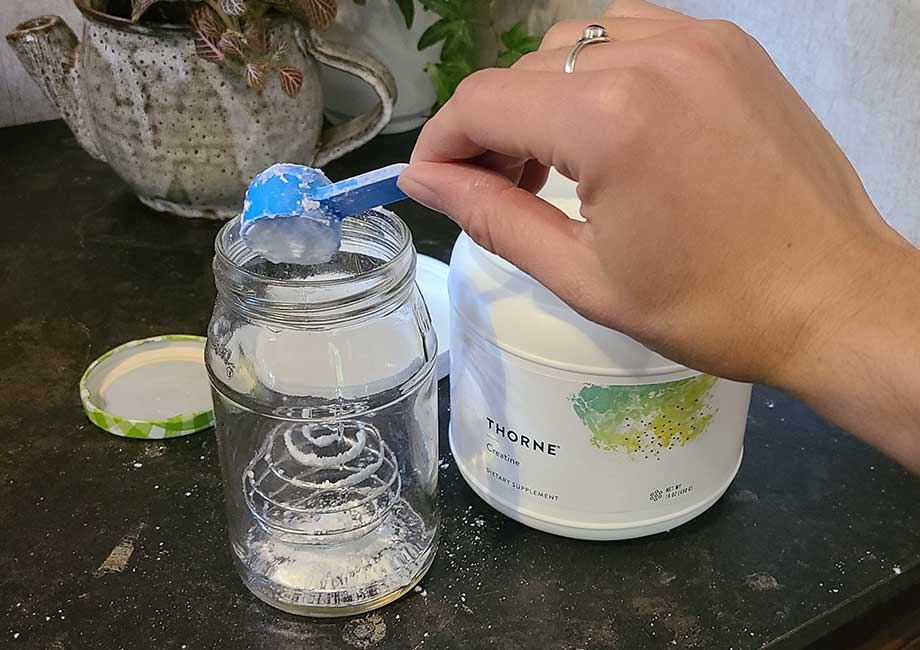
But this is also when you may experience bloating and water retention (read: weight gain in the form of excess water). Creatine enters the skeletal muscle via a sodium-dependent transporter6. Because the cells take in sodium, they also pull in water to help maintain the right electrolyte balance in your cells. This can ultimately lead to water retention and a higher number on the scale. In one small study7, male soccer players gained as much as 2.3 pounds of water weight.
However, this doesn’t happen all the time. There are a number of studies where participants experience no water retention or weight increases at all, even after a creatine loading phase. In one study that was published in the International Journal of Kinesiology and Sports Science8, resistance trained men who took 0.3 grams of creatine per kilogram of lean body mass per day for one week (about 20 grams) then dropped down to 0.075 grams per kilogram of lean body mass per day for four weeks (about 5 grams) had no changes in water weight or total body weight.
Basically, you might experience some water weight gain or you might not. If you want to lessen your chances, you can skip the loading phase altogether, but it will take longer to saturate your muscles.
Typically, a one-week loading phase is followed by a maintenance dose of about 3 to 5 grams per day. But the loading phase isn’t absolutely vital9. It will just take about a month to saturate your muscles, instead of a week.
If you’re trying to lose weight, the good news is that water weight gain is temporary. Even if the scale goes up, it typically resolves in a few weeks.
If you’re trying to gain weight, the bad news is that water weight gain is temporary. To build lean muscle mass, you’ll need to stick with the creatine supplementation and add some resistance training (if you’re not doing it already).
Creatine and Lean Body Mass
Now that we’ve covered water weight, let’s talk about lean body mass. Creatine doesn’t directly increase lean body mass. In other words, it’s not a magical supplement that’s going to positively change your body composition without any effort from you.
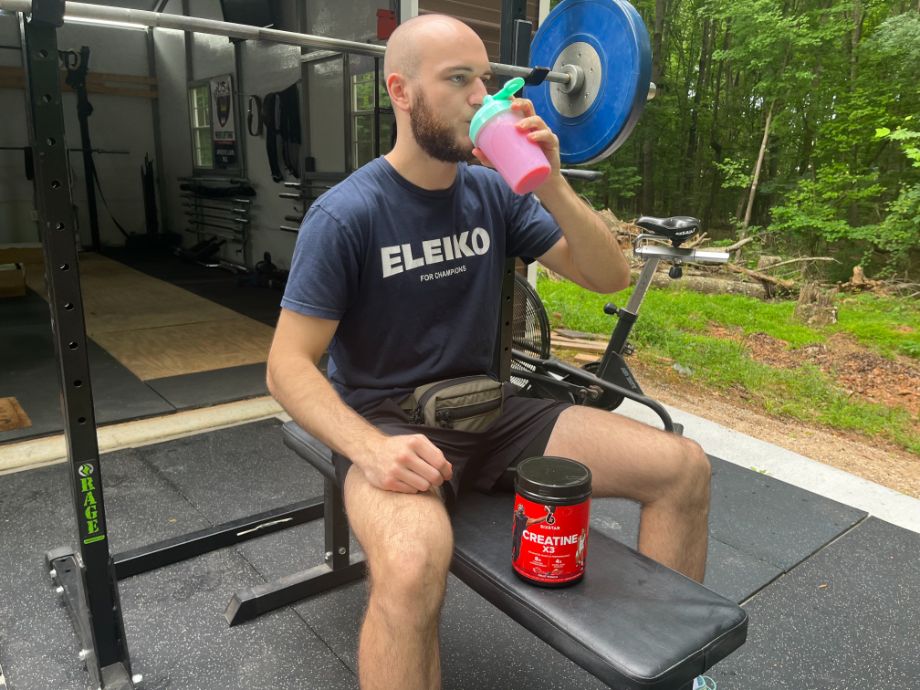
However, creatine gives your muscles a boost of energy and can help improve your exercise performance—two things that can help build lean body mass and contribute to weight loss with consistency and regular effort. For example, you may be able to lift heavier weights or do more reps. And research does show that combining creatine with resistance training and weight lifting can help improve your body composition more than exercise alone.
RELATED: Does Creatine Help You Lose Weight?
Several studies show that taking creatine with various types of training can increase muscle strength10 and lean body mass, while also reducing body fat. One meta-analysis11 compared training with creatine supplementation to resistance training alone. They reported that average muscle strength was about 8 percent greater in those who took creatine. The creatine group also had a 14% increase in weightlifting performance.
Another review published in the Journal of Functional Morphology and Kinesiology12 looked specifically at how creatine could affect older adults (those 50 and older). After reviewing 19 studies, the researchers concluded that older adults who combined creatine supplementation with resistance training had a greater reduction in body fat percentage than a placebo group who did resistance training with any creatine.
Research13 also suggests that creatine can help with post-workout recovery and injury prevention—two things that ensure you’re able to stick with your regular workout routine, which is most important for changing your body composition.
What Is Creatine?
Before we dive into creatine’s effect on weight, let’s back up and discuss what creatine is, exactly. Creatine is an amino acid that’s found mostly in your muscle cells1. About 95% of the creatine in your body is located in your skeletal muscle in the form of phosphocreatine. The other 5% is split between the brain and testes.
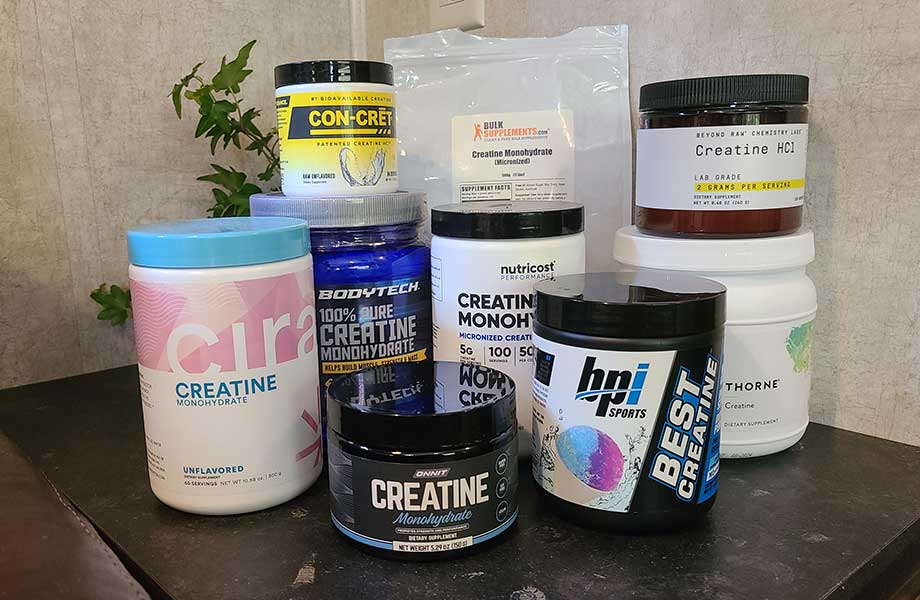
Your body gets creatine in three ways:
- It can produce it with help from your pancreas, liver, and kidneys.
- You can get it from your diet, specifically red meat and seafood.
- You can take it in supplemental form—creatine monohydrate is the most popular form of creatine supplement because it’s the most highly bioavailable2.
RELATED: Best Creatine Supplements
What Happens To Your Body When You Take Creatine?
Your body largely uses creatine for energy. When you take creatine supplements, the creatine binds with phosphate to create creatine phosphate. Creatine phosphate is then used to create adenosine triphosphate3 (ATP), an energy source that your body uses to contract your muscles and pull off explosive movements4, like sprints.
Creatine supplements also help replenish ATP and creatine stores in your muscles, which can improve athletic performance. Increased creatine levels can also lead to positive training adaptations that help you build muscle mass and muscle strength1.
Other Creatine Side Effects
There are really no notable side effects of creatine supplementation. It’s well-tolerated by most people, even when taken in doses of up to 5 grams of creatine per day.
Some people think that creatine can cause hair loss, but that’s a common misconception, too. While research14 shows that creatine can raise levels of dihydrotestosterone (DHT), a byproduct of testosterone that’s linked to hair loss, there are no studies that actually report any hair loss in those taking creatine supplements.
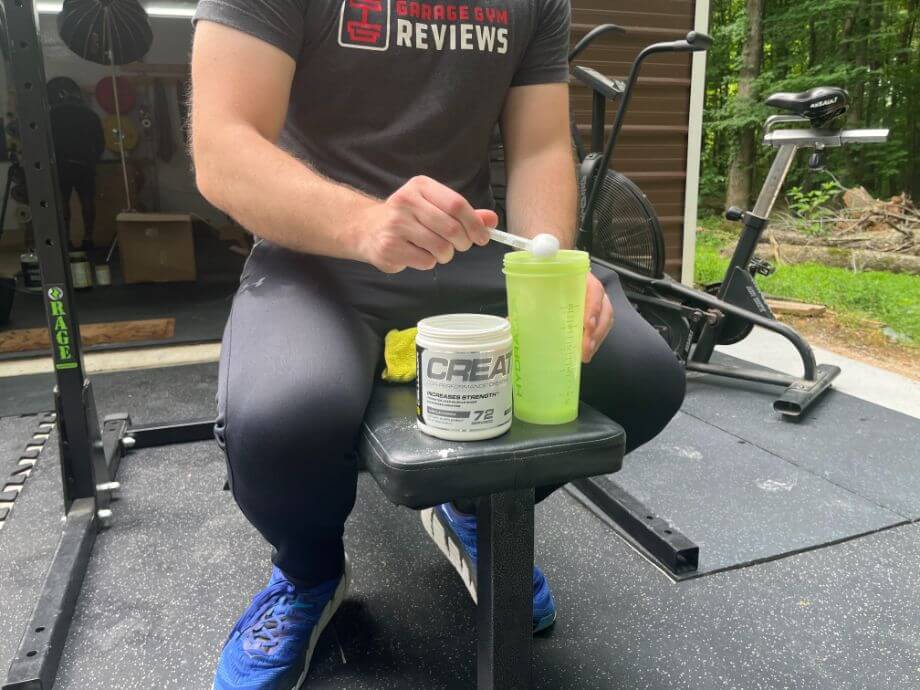
Studies have also shown that creatine does not cause dehydration, muscle cramps, or heat intolerance, some other common beliefs6.
The bottom line is that both short-term and long-term use is considered safe, even with high doses of creatine.
What To Do If You Gain Weight With Creatine?
Because you’re now aware creatine supplementation causes weight gain via water retention, there are a few methods for managing this:
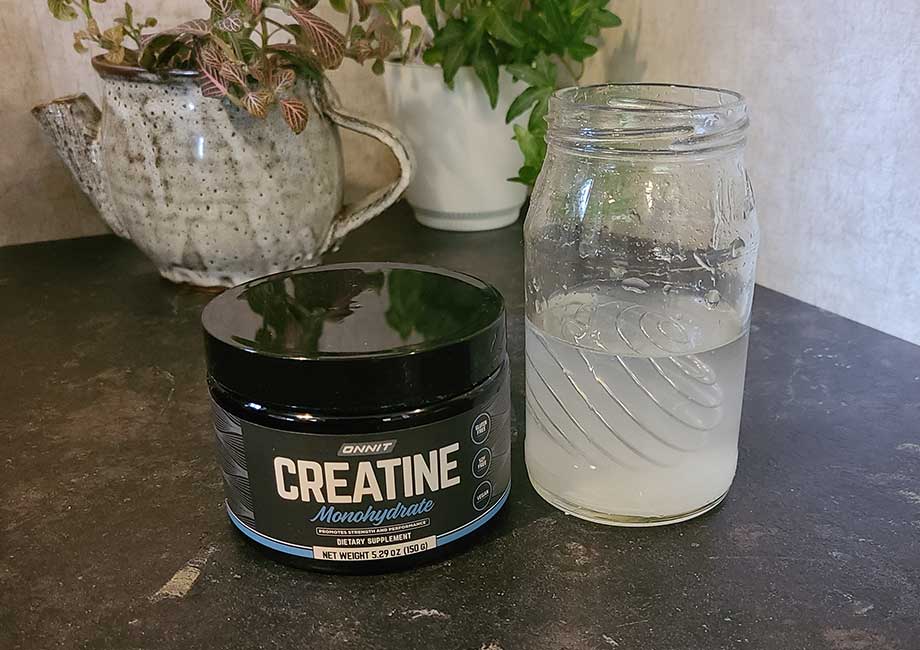
- Pay attention to your sodium/salt intake. If you’re retaining water, then reducing your sodium levels may help.
- Drink more water. I’m full of water; now you want me to drink more? Yes, you can expel excess water through urination.
- Look at your other macros. Are you eating higher amounts of carbs in addition to taking creatine? I wouldn’t suggest cutting carbs completely as they help generate the energy you need to train, but limiting this macro may help mitigate your water retention/bloating.
- Discontinue use: When you stop taking creatine, the body should shed that excess water weight.
Does Creatine Make You Gain Weight? Final Thoughts
Technically, yes, but probably not in the way you think. Creatine can contribute to some extra water weight (that’s temporary) and lean muscle gain, which may increase your weight. But creatine supplementation doesn’t cause fat gain.
Does Creatine Make You Gain Weight? FAQs
Will creatine make me gain belly weight?
No, creatine doesn’t cause any fat gain, so it will not contribute to actual belly weight. That being said, the water retention that can accompany oral creatine supplementation may make you feel like your belly is bigger. This type of creatine weight gain is temporary, though, so you should notice it going back down in a few weeks.
What happens when I stop taking creatine?
You only experience the benefits of creatine while you’re taking it. When you stop, your energy levels and muscle strength will likely return to their baseline. This could lead to decreases in exercise capacity and performance, which can also delay muscle growth. That being said, it’s entirely possible to reach your goals without creatine.
Can creatine affect your mood?
It’s possible, but rare. Two small human studies15 did show negative changes in mood and anxiety in those who use creatine, but there’s not enough scientific evidence to say that creatine will affect your mood. For most people, it doesn’t.
Should I take creatine while trying to lose weight?
At its core, creatine is used for energy production to help power your body through training sessions. Your diet plays a significant role in weight loss, but regular exercise is just as important. While excess water weight gain from creatine can be disconcerting, it’s also temporary and shouldn’t affect your fitness goals.
Does the creatine weight go away?
Excess water weight from creatine use should go away as you train or if you discontinue use.
Does creatine make you puffy?
The puffiness or bloating caused by creatine is due to water retention within your muscles. Creatine bloating is temporary, though, and should resolve after a few days or a week, depending on the amount of creatine you’re taking.
These statements have not been evaluated by the Food and Drug Administration. This product is not intended to diagnose, treat, cure, or prevent any diseases.
References
1. Kreider, RB, Kalman, DS, Antonio, J, et al. International Society of Sports Nutrition position stand: safety and efficacy of creatine supplementation in exercise, sport, and medicine. J Int Soc Sports Nutr. 2017;14:18. doi:10.1186/s12970-017-0173-z
2. Kreider, RB, Jäger, R, Purpura, M. Bioavailability, efficacy, safety, and regulatory status of creatine and related compounds: a critical review. Nutrients. 2022;14(5):1035. doi:10.3390/nu14051035
3. Saito, S, Cao, DY, Okuno, A, et al. Creatine supplementation enhances immunological function of neutrophils by increasing cellular adenosine triphosphate. Biosci Microbiota Food Health. 2022;41(4):185-194. doi:10.12938/bmfh.2022-018
4. Riesberg, LA, Weed, SA, McDonald, TL, Eckerson, JM, Drescher, KM. Beyond muscles: The untapped potential of creatine. Int Immunopharmacol. 2016;37:31-42. doi:10.1016/j.intimp.2015.12.034
5. Gann, JJ, McKinley-Barnard, SK, Andre, TL, Schoch, RD, Willoughby, DS. Effects of a traditionally-dosed creatine supplementation protocol and resistance training on the skeletal muscle uptake and whole-body metabolism and retention of creatine in males. J Int Soc Sports Nutr. 2015;12(Suppl 1):P2. doi:10.1186/1550-2783-12-S1-P2
6. Antonio, J, Candow, DG, Forbes, SC, et al. Common questions and misconceptions about creatine supplementation: what does the scientific evidence really show?. J Int Soc Sports Nutr. 2021;18(1):13. doi:10.1186/s12970-021-00412-w
7. Deminice, R, Rosa, FT, Pfrimer, K, Ferrioli, E, Jordao, AA, Freitas, E. Creatine supplementation increases total body water in soccer players: a deuterium oxide dilution study. Int J Sports Med. 2016;37(2):149-153. doi:10.1055/s-0035-1559690
8. Andre, T. L., Gann, J. J., McKinley-Barnard, S. K., & Willoughby, D. S. Effects of five weeks of resistance training and relatively-dosed creatine monohydrate supplementation on body composition and muscle strength, and whole-body creatine metabolism in resistance-trained males. Int J Kines & Sports Sci. 2016;4(2):27-35. doi: 10.7575/aiac.ijkss.v.4n.2p.27
9. Hall, M, Trojian, TH. Creatine supplementation. Curr Sports Med Rep. 2013;12(4):240-244. doi:10.1249/JSR.0b013e31829cdff2
10. Wu, SH, Chen, KL, Hsu, C, et al. Creatine supplementation for muscle growth: a scoping review of randomized clinical trials from 2012 to 2021. Nutrients. 2022;14(6):1255. doi:10.3390/nu14061255
11. Rawson, ES, Volek, JS. Effects of creatine supplementation and resistance training on muscle strength and weightlifting performance. J Strength Cond Res. 2003;17(4):822-831. doi:10.1519/1533-4287(2003)017<0822:eocsar>2.0.co;2
12. Forbes, SC, Candow, DG, Krentz, JR, Roberts, MD, Young, KC. Changes in fat mass following creatine supplementation and resistance Training in adults ≥50 years of age: a meta-analysis. J Funct Morphol Kinesiol. 2019;4(3):62. doi:10.3390/jfmk4030062
13. Hall, M, Manetta, E, Tupper, K. Creatine supplementation: an update. Curr Sports Med Rep. 2021;20(7):338-344. doi:10.1249/JSR.0000000000000863
14. van der Merwe, J, Brooks, NE, Myburgh, KH. Three weeks of creatine monohydrate supplementation affects dihydrotestosterone to testosterone ratio in college-aged rugby players. Clin J Sport Med. 2009;19(5):399-404. doi:10.1097/JSM.0b013e3181b8b52f
15. Allen, PJ. Creatine metabolism and psychiatric disorders: does creatine supplementation have therapeutic value?. Neurosci Biobehav Rev. 2012;36(5):1442-1462. doi:10.1016/j.neubiorev.2012.03.005
Further reading

Next to protein powders, creatine is one of the most popular sports nutrition supplements. But it’s also no stranger to controversy. Those who love it swear by it, and those who don’t use it have a lot of questions—like, “does creatine make you gain weight” or “does creatine cause hair loss?” As fans of creatine ourselves, we’re here to put some rumors to rest. Since a lot of misconceptions around creatine stem from misinterpreted science, » Read more about: Does Creatine Make You Gain Weight? Science Tells the Truth » Read more

We love the stalwart flat bench press, but the incline barbell bench press is just as deserving of a spot in your rotation. Find out why here! Read more

Next to protein powders, creatine is one of the most popular sports nutrition supplements. But it’s also no stranger to controversy. Those who love it swear by it, and those who don’t use it have a lot of questions—like, “does creatine make you gain weight” or “does creatine cause hair loss?” As fans of creatine ourselves, we’re here to put some rumors to rest. Since a lot of misconceptions around creatine stem from misinterpreted science, » Read more about: Does Creatine Make You Gain Weight? Science Tells the Truth » Read more

Next to protein powders, creatine is one of the most popular sports nutrition supplements. But it’s also no stranger to controversy. Those who love it swear by it, and those who don’t use it have a lot of questions—like, “does creatine make you gain weight” or “does creatine cause hair loss?” As fans of creatine ourselves, we’re here to put some rumors to rest. Since a lot of misconceptions around creatine stem from misinterpreted science, » Read more about: Does Creatine Make You Gain Weight? Science Tells the Truth » Read more

